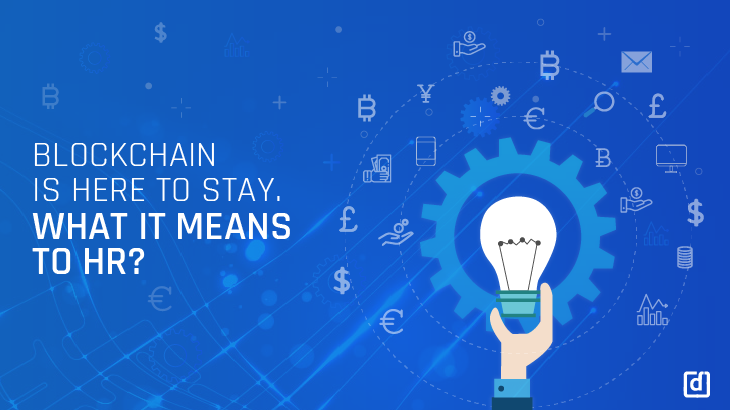
Blockchain technology is typically associated with cryptocurrencies. However, according to experts, that’s only the beginning. With the pathbreaking success of cryptocurrencies like Bitcoin and Ripple making headlines, there is a need to consider applications of blockchain beyond the domain of cryptocurrency too. Blockchain servers, powered by blockchain technology, have the ability to handle secure transactions and data storage, further expanding its use cases across industries.
Talking about the impact on HR as a function, blockchain is all set to revolutionize the subdomains of payroll and recruitment. While the why of this is answered by the thumb rule of change for betterment, it is the how that needs to be evaluated.
For recruitment: Since you can only add to the data stored on blockchain, a repository of candidates’ qualifications can be maintained. Instant access to this holistic information could reduce the amount of time a recruiter spends verifying information. Thus, mining of this data becomes easier.
Blockchain could be of great value to recruiters who will be able to find great talent by leveraging this technology. It would help organizations recruit smoothly and in return would also boost a company’s passive recruitment efforts. This provides a competitive edge to the recruitment team given the cutthroat competition and a very limited pool of talent.
Also, with a central repository of data makes the ethical verification of counterparties identity easier, without the involvement of any middlemen.
Coming to the aspect of financial management, there is a lot of buzz around the impact of cryptocurrency on payroll. Tashina Charagi, Vice President at ADP corporate strategy groups in an interview said, "I’m not endorsing the idea, but it feels that there is a market out there for contract employees who are looking to be paid in cryptocurrency."
From a broader perspective, there are three other major areas which could create a greater impact on HR. These are cross-border payments, productivity gains and enhancement of cybersecurity.
Cross-border payments: Blockchain has the potential to smoothly manage cross-border payments and employee mobility, including international expenses and tax liabilities. It would be possible for organizations to create their own corporate currencies through blockchain technology. It is also being forecasted that over time, central banks will also be involved, launching with their own means of exchange to support exchange into official currencies.
Increase in productivity: The ability to match people’s skills and performance in their respective jobs would result in the elevation of the overall productivity of the business. Blockchain technology could help in fostering productivity, by automating and reducing the burden of mundane. Area related to accounting, supply chain management, and legal would face significant disruption as the technology spreads. For instance, contracts like the self-executing programs that track the terms of agreements would reduce the need for legal involvement when vendors fail to deliver on their obligations. Data-heavy processes like VAT administration and payroll would also be processed with higher value and ease.
Enhancement of Cyber Security: Given the rising number of incidents related to data breach, companies of all sizes today, is focused on protecting networks, servers, and data from attacks, damages, and unauthorized access. As blockchain technology is a part of the public domain, all important additions and variations can be patented. One popular area for such patent is security with a focus on encryption techniques. According to The Economist, MasterCard has filed for a patent for blockchain centered payment methods, and Goldman Sachs has filed for one that simplifies processing foreign-exchange transactions. Organizations have started leveraging the offerings of blockchain to protect critical intellectual property or information that could be a matter of extreme implications like national security.
For early adopters and evangelists of this technology, it feels a lot like Silicon Valley in the early 90s. It is surely something that has arrived with a bang. Blockchain technology, therefore, has vast potential and its practical applications are unlimited. It can literally be used to transform a complete business process. It is very clear that ones who make strategic moves will gain huge profits from the disruption of traditional business models.
If you want to know more on the blockchain, then this report from CB insights could be of great help.
Any more interesting applications of blockchain in HR and beyond?
Tell us in the comment section below!


Speak Your Mind